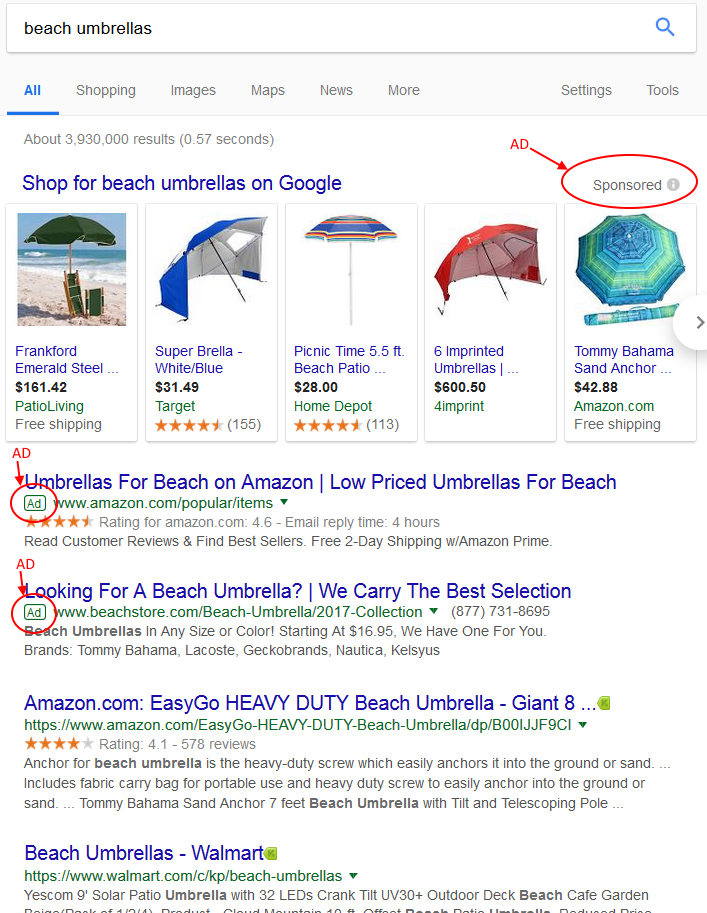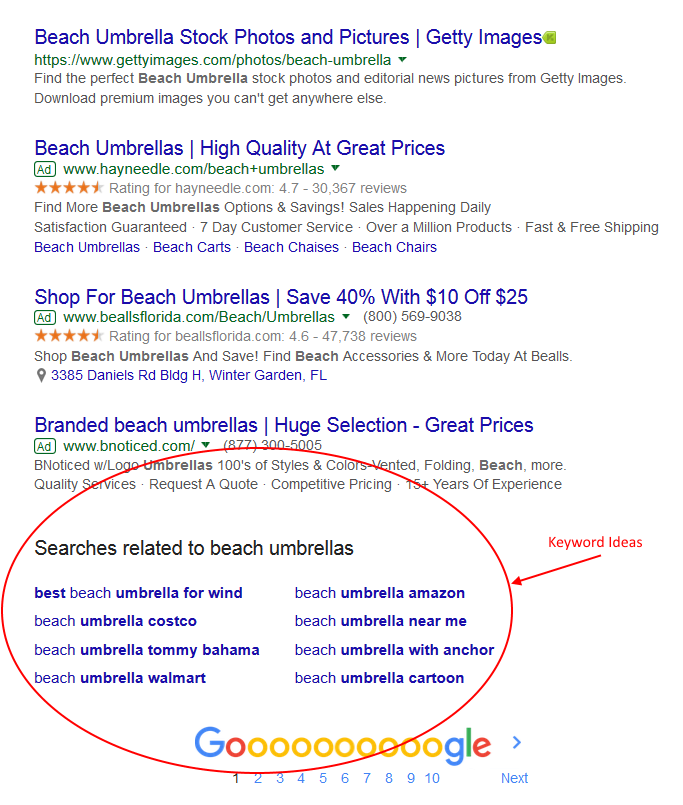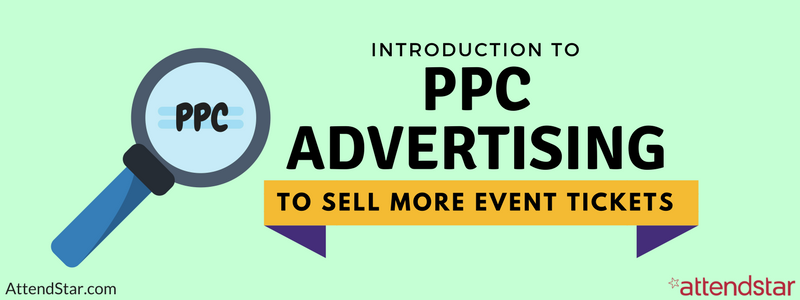PPC advertising is very effective to help raise awareness of your event brand and to sell more tickets. PPC is an acronym for pay-per-click. PPC advertising is a type of online advertising that can be very affordable for small and large brands. These ads appear at the top of a search engine results page (SERP) when you search for keywords using a search engine like Google. They usually have “AD” in small text next to them or they could appear as product-listings (see the image below for an example from a Google search for beach umbrellas). PPC ads are also referred to as paid search ads.

Google isn’t the only search engine that displays PPC advertising. Bing and Yahoo do, too. In simplest terms, when you invest in PPC advertising, you pay every time someone clicks on your ad. By clicking on your ad, they’re taken to the URL you specify when you set up your ad.
Typically, you set a maximum amount that you’re willing to spend per click on your ad, and the search engine – we’ll say Google as the example in this article – uses its algorithm to determine which paid search ads to display along with the organic (non-paid) search results.
Choosing Keywords for Your PPC Ads
Your goal as an event organizer and PPC advertiser is to choose keywords to bid on that people who are interested in your event are likely to type into the Google search box. You want to show your ad to people when they show an intent to find an event like yours.
The easiest way to come up with keyword ideas is to visit Google and type in words that you might use to find an event like yours. As the image below shows, when you start typing a search query, Google provides you with a bunch of keyword suggestions. These are a great place to start!

You can also scroll to the bottom of the Google results page once you enter a search term to find more keyword ideas as pictured in the image below. Notice there are more PPC ads shown at the bottom of the search results page, too.

If you need more help finding keywords, you can use a free tool like the Google Keyword Planner or Moz’s Keyword Explorer, and if you have a budget for keyword research, SEMrush is a popular option.
Writing Your PPC Ad and Landing Page
With your keywords selected, your next step is to write a highly-relevant and targeted ad that piques people’s interest in your event. Remember, the goal is to motivate people to click on the ad to learn more, but your ad also needs to promise that by clicking on it, people will get the right answer to their search query. Matching your ad copy to the search intent is critical.
In addition, make sure people land on a targeted landing page when they click on your ad. For example, this page could be your ticket sales page, where people can instantly understand that they’ve arrived at the right place based on their search query and your ad’s promise. Importantly, don’t forget to include the 20 critical features that boost ticket sales in your ticket sales page!
Setting Your PPC Advertising up for Success
PPC advertising can be tricky. Before you get started, think about how much money you have to invest in paid search ads. If you’re not careful, you could spend a lot of money with very small results. For PPC advertising to work effectively and stay affordable, you need to set up your campaigns correctly and monitor them closely.
In addition, testing is critical, which is why working with a PPC advertising expert is a good idea. A PPC expert can help you make the right keyword choices, leverage negative keywords, match your ad copy to your keywords, optimize your bids, and more.
Another reason PPC advertising can be tricky on Google is because of something referred to as Google’s AdWords quality score. Google AdWords is Google’s PPC advertising network, and every ad served through AdWords is given a quality score of 1-10 based on how well the ad answers the search user’s question. The ad copy and the landing page are evaluated for relevance and overall user experience, and your ad is given a quality score based on that evaluation.
Your ad’s Google quality score matters a lot because the score directly affects how often your ad is displayed in search results. Think of it this way. You’re probably not the only advertiser bidding on your chosen keywords. If you want your ads to be displayed, you need to not just outbid competitors, but you also need to have a higher quality score. In other words, for your ads to be displayed and drive the results you want, you need the right bid and you need to deliver a better experience to the people who click on your ads.
Finally, make sure your PPC ads are mobile friendly. The majority of search traffic and web activity happens on smartphones and tablets today, so your ads must be optimized for mobile devices or you’re missing opportunities to get in front of audiences who might want to buy tickets to your event.
Your Next Steps for PPC Advertising
To maximize the benefits of PPC advertising and significantly increase ticket sales to your event through paid search ads, you need to identify your target market, determine the action you want people to take after they see your ad, choose laser-focused keywords that fit your budget, write relevant ads and landing pages that match your keywords, and monitor your results closely. Be prepared to test, tweak, and test again!
Most importantly, start slow and expand your budget and campaigns as you start to learn what drives the best results for your event and your goals. PPC advertising is very effective, so don’t give up if your results aren’t amazing immediately. Keep trying or hire an expert to help you.


